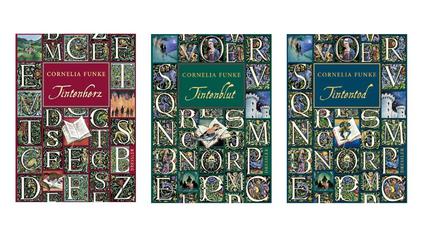Cornelia Funke - Tintenwelt-Trilogie (Inkheart Trilogy)
Legolas Send a noteboard - 22/11/2011 09:08:47 PM

It's probably a bit of an understatement to say that, since J.K. Rowling's Harry Potter series started to become a worldwide phenomenon about a decade ago, there have been a lot of fantasy-inspired young adult books and, more often, series. Too many to keep track of even for dedicated and fantasy-loving readers of the right age category, I dare say - and that's even if you limit yourself to the Anglo-Saxon authors. But just like Harry Potter, the trend has spread far beyond that, and there are now plenty of authors in other languages that have gained international renown with series of this kind.
One of the most successful of those is the German (though living in the US) Cornelia Funke, whose Inkheart Trilogy has been translated into more than forty languages, and one movie so far (if not a particularly successful one, despite the impressive cast). Since I can always use an opportunity to practice my German, and since I've long felt a certain obligation to have at least a remote idea of what's going on in non-English speculative fiction, I decided to read it - read the first two books more than a year ago, in fact, but the third one only now.
It doesn't take one long when starting this trilogy to come to one obvious conclusion: Ms. Funke really, really loves books. In many ways, the entire trilogy is focused on that: her love for books, for the emotions inspired by well-written characters and settings, for how a good book can sweep one off one's feet. It shows in the miniature-adorned covers of the books, in the quotes from quality authors (mostly (children's) fiction, but also some poetry and even a few comments on how to write stories) opening each chapter, and of course in the story.
The first novel, Inkheart, begins with Mortimer, a bookbinder, and his early-teenage daughter Meggie. Both are rather obsessed with books, and Mortimer's talent lies not only in creating or repairing books, but also in reading from them - although he hasn't ever read aloud as far back as Meggie can remember. Before long, the reason why becomes clear: the last time Mortimer read aloud from a book, the fantasy story Inkheart, he suddenly found himself facing three characters from the book - the hero and the two villains - in his living room, while his wife had vanished into thin air. Or rather, into the book. But after ten years of wandering through an alien world, the Inkheart characters are now returning to Mortimer and his daughter, and not necessarily with good intentions.
That book was originally a stand-alone, and at the end order is more or less restored. Funke decided - rightly, I think - that her premise left room for more, though, and followed it up with Inkspell and Inkdeath, in which Meggie manages to read herself into the Inkheart universe, with all the unintended consequences one might expect. A premise much less original than the one of the first book - fantasy characters in the real world have been done rather less than real-world characters in a fantasy world, I should think. Nevertheless, despite the rather large amount of clichés - to a large extent intentional, no doubt - Funke manages to write a good story.
For a contemporary YA bestseller series, the Inkheart Trilogy is often astonishingly sedately-paced. Like the books that inspired the author, but unlike most similar efforts in recent years, this series takes its time to tell its story, and keeps things relatively simple (despite the meta-fiction aspects). It's no wonder that one regularly encounters T.H. White's Once and Future King and William Goldman's Princess Bride in the chapter-opening quotes (even if Rowling's faster-paced Harry Potter makes a fair few appearances as well). A defensible approach, but in each of the three books there are places where it can get somewhat frustrating. The third book in particular takes a very long time to get going - though when it does, it delivers. Meggie's loathing of stories with a sad ending is indicated often enough throughout the series that one never expects anything but a happy end, but the final climax is still unpredictable enough that the reader isn't disappointed. Except perhaps in Funke's rather bizarre decision to keep her young protagonist entirely out of that part of the action. Sure, there are enough other interesting characters involved to keep things exciting, but it's strange all the same: as Meggie evolves throughout the series from a child into a young woman, her role grows smaller instead of larger.
Not all of Funke's characters are particularly memorable, some are well-written but exceedingly annoying, and even some of the interesting ones can be criticized on several points. Still, on the whole, Funke's characterization is rather good - even if the iconic Dustfinger becomes a little too overpowered for his own good in the final book (or for the good of his characterization, anyway).
On the balance, this trilogy is not exceptionally good, but still easily good enough that I can recommend it to all younger and/or young-at-heart (
 ) readers here, without feeling like I'm unduly biased by my sympathy for Funke's excellent taste in books (as evidenced in the chapter quotes) and her contagious love of storytelling.
) readers here, without feeling like I'm unduly biased by my sympathy for Funke's excellent taste in books (as evidenced in the chapter quotes) and her contagious love of storytelling.
Cornelia Funke - Tintenwelt-Trilogie (Inkheart Trilogy)
- 22/11/2011 09:08:47 PM
735 Views
I think I have seen the film
- 22/11/2011 10:21:06 PM
380 Views
Yes, it is. (minor spoilers, I guess, for those sensitive to that)
- 22/11/2011 10:33:04 PM
381 Views
I would probably be interested in these books if they were for a more adult audience.
- 25/11/2011 04:31:05 PM
422 Views







